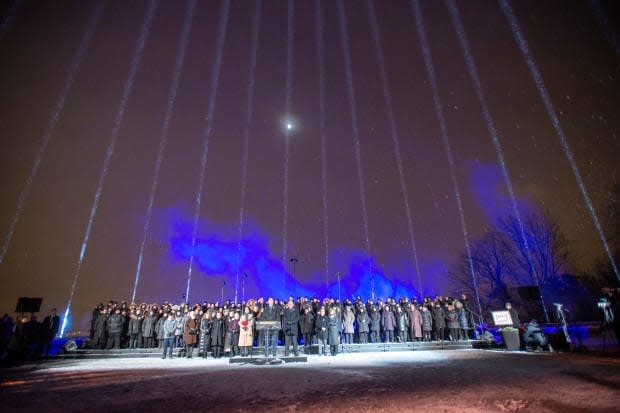Two students at Polytechnique Montréal reflect on how the tragedy shaped their paths

At 23 years old, engineering student Asmae Danouj is the same age as four of the 14 young women who were killed in a violent act fuelled by anti-feminist beliefs at Montreal's École Polytechnique on Dec. 6, 1989.
Currently enrolled at the same school 32 years after the brutal, targeted mass shooting, Danouj understands the significance of being able to pursue a dream once stripped from other women in her exact position.
"In my studies, I just came to realize how privileged I was," the fourth-year undergraduate student, who is studying biomedical engineering at the school now known as Polytechnique Montréal, told CBC Montreal's Daybreak.
As Quebecers plan moments of silence and solemn ceremonies to mark the 32nd anniversary of the tragedy, Danouj sees the day as a statement of resiliency by the women engineers who are carrying on the victims' legacies.
"[It shows that] no matter what, or no matter who is standing in our way, we will take the place that we have the right to. And it's like a fuel, we will not be stopped," she said.
For Justine Petrucci, a 25-year-old master's student in civil engineering in her sixth year at Polytechnique, Dec. 6 is a day to remember the women trailblazers in engineering whom she credits for carving out a space for her.
"It allows me to remember all the woman who have come before me and the path they have travelled," she said.
"And because of that, I feel like ... now it's up to me to keep going for those who will come after me."
'Women still have to fight for their places'
As president of the student association at Polytechnique, Danouj says the school places a large emphasis on equality.
"I think there's this community that gives so much importance to the women's place in engineering," she said. "It's just so strong here, like in between these walls, everyone's talking about [equality.]"
But she notes there's still a lot of work to be done in combating the unfair treatment of women in the continually male-dominated industry.
"I cannot deny the fact that it is a struggle, no matter what, no matter how far we've come in the industry, the women still have to fight for their places," she said.
"As a woman, you still need to make that extra effort to make your place acknowledged, to make your value acknowledged, so that other students do understand that you're here because of your skills."

In the face of these persistent barriers, Petrucci points to an unofficial count of 18 women killed in a spate of homicides targeting women in Quebec since the beginning of 2021, which she says magnifies the weight of the anniversary of the tragedy this year.
"Sometime we are wondering if the tragedy that happened at Polytechnique might happen again, just because there's that distress in our community," she said.
However, she says the subject of sexism and misogyny are topics discussed much more widely these days among her male colleagues, and they are "sensible to our calls and the challenges that women experience in the engineering world."
Danouj says conversations are a start, but women also have to start taking up the space that they deserve in the industry — something she wishes she knew years ago.
"I remember myself in first year ... I just never had the confidence, but like the place is there," she said.
"What I would tell to other women is take it; you have the right to."
Inspiring the next generation of girls
Petrucci says she uses her position as a female engineering student in higher education to inspire and encourage young girls as a way of turning the tide in the industry.
She's a student ambassador for GéniElles, a program offered at Polytechnique that aims to encourage the next generation of young women to enter science or engineering fields by demystifying career possibilities.
"We also give scholarships ... we do some conferences. And so the girls can ask me their questions about how it was to get [to be] a woman in engineering, why did I choose to do my studies in engineering.... It's all about sharing my experience and getting women being more represented."
The program offers a host of various initiatives for girls ages 12 to 20 and contributes to Engineers Canada's 30 by 30 initiative, which aims to have at least 30 per cent of women among newly licensed engineers by 2030.
When asked to explain what being a woman in engineering is like in 2021, Petrucci said that, thanks to the women pioneers in the field before her time, she doesn't have to.
"At Polytechnique, at school in general ... I didn't feel that different [from] my male colleagues," she said.
"The goal is that we don't think about this question anymore and that women are just part of the engineering world."

 Yahoo Movies
Yahoo Movies 